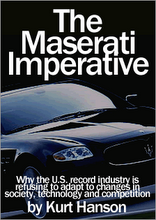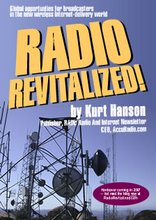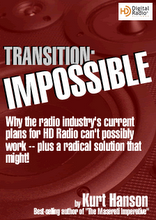The Los Angeles Times, considered by some to be the major-newspaper mouthpiece for the entertainment industry (for example, I remember when it published a positive review of the big-budget Matthew Broderick/Hank Azaria "Godzilla" movie!), gave a largely positive spin today (here) on the story that "with CD sales tumbling, record companies and musicians are looking at a new potential pot of money: royalties from broadcast radio stations."
One choice quote:
"Mary Wilson... [one of the] original Supremes, said the exemption was unfair and forced older musicians to continue touring to pay their bills."After so many years of not being compensated, it would be nice now at this late date to at least start,' the 63-year-old Las Vegas resident said in Milwaukee, where she was performing at the Potawatomi Bingo Casino. 'They've gotten 50-some years of free play. Now maybe it's time to pay up.'"
Another interesting, uncontested quote was:
"'The creation of music is suffering because of declining sales,' said RIAA Chief Executive Mitch Bainwol."
Since proof of this concept -- that the creation of music is suffering -- would be critical to revising copyright law in the actual spirit of copyright law, it would be interesting to see if there is any factual support for this assertion. (But let's save that for later.)
Let's do the math
What I thought I'd do today is take a look at what would happen to the terrestrial radio industry if it had to pay a performance royalty similar to the CRB rate for 2007 that webcasters are currently faced with.The math is actually pretty simple:
- Radio is a $20 billion business.
. - What's the audience size? Of America's 250 million 12+ population, at the average moment (Mon-Sun 6AM-Mid), about 14% of the population is listening to the radio. So, 250 mil x .14 = 35 million radio AQH (i.e., average audience).
. - How many songs is that? Let's assume about 67% of that listening is to music-based radio stations, playing about 12 songs per hour, 18 hours per day (6AM-Mid), 365 days per year. Then add an extra 10% to account for songs played overnight (Mid-6AM). 35 million x .67 x 12 x 18 x 365 x 1.10 = 2,033,677,800,000 song performances per year. (Important note: Every one of those over 2 trillion song performances is a 3-minute-long promotion for buying it (assuming it's made available and priced reasonably by the label).) *
. - What's the potential royalty obligation? Multiply the 2007 CRB rate of $.0011 per performance by a bit over 2 trillion performances, and you get $2,237,045,580. Divide that figure by industry revenues of $20 billion, and you learn that this payment would comprise 11.2% of total industry revenues.
. - What does that do the radio industry? It destroys the entire profitability of the industry! Going alphabetically through some publicly-traded companies and their "net income": Beasley has about a 8% profit margin; Citadel, negative; Clear Channel, 10%; Cox Radio, 13%; Cumulus; negative; Emmis, negative; Entercom, 9%; RadioOne, 14%; Saga, 9%; Salem, 9%... On average, it appears that the industry average is less than 11.2%..
.
...Which means that a CRB-like royalty rate would DESTROY the radio industry, by eating up more than 100% of the entire industry's profits! (BTW, it gets worse later in this decade. The CRB rate goes up to $.0019 per performance, which, assuming radio's AQH and revenues stay about constant, would equate to about 19.3% of industry revenues.)
"A new potential pot of money" =
More cash for Mary Wilson?
By the way, if in fact the RIAA got a sound recordings performance royalty imposed on broadcast radio, and if somehow half of that royalty got promised to the recording artists (for which there are no guarantees right now; as far as I know, it's nothing that the copyright owners of sound recordings have proposed), and if the rate that got imposed was a CRB 2007-like rate of $2.2 billion, then former superstar artists like Mary Wilson might be looking at $100K per year ** in income.
But does anyone truly think that the lack of a broadcast performance royalty is what's preventing Mary from going into the studio and making new art? ***
That's the actual supposed intent of copyright law -- to encourage innovation and creation of new work!
========================================
FOOTNOTES:
* But is this true -- is it promotional? Well, ask yourself this: If the Supremes were to be taken off every oldies station in America, would sales of their CDs (including box sets) and digital tracks go up or down? Given the general truth of the principle "Out of sight, out of mind," I would assume they would go down. But we could check that! In New York, when the oldies stations WCBS-FM went away, did sales of doo-wop CDs go up? I can't imagine that they did. In Los Angeles, when listeners lost their FM country music station a year or so ago, did sales of country CDs go up? Seems improbable. (But it's checkable!)
** What's my math? Let's imagine there were $2.2 billion in royalty revenues to split up. And let's imagine that 50% would go to artists. About 2% of U.S. stations are oldies stations, about 1.333% of songs played on oldies stations are Supremes songs (i.e., about 8 titles on a 600-song playlist), and there were 3 members of the group. $2.2 billion x .5 x .02 x .01333 / 3 = $98K per year. (Of course, the Supremes were atypically popular; members of the Strawberry Alarm Clock would see much less.)
*** Ah, but one might argue, "This is to motivate the next generation of Mary Wilsons to record new music." But this argument also doesn't seem to make sense either: Are there any singer-songwriters out there who are deciding not to create music in 2007 because they're looking ahead to the year 2047 and finding the prospects for potential royalty payments to be insufficiently remunerative? (Plus which, the only way for a new artist today to potentially become beloved enough in America to have oldies that are receiving airplay in 2047 would be to have some hit albums now, and the best route to achieving that would be via airplay from a thriving radio industry, including Internet radio, with its wider variety of genres and its deeper and wider playlists -- which is in jeopardy due to royalty rates!)




7 comments:
HOLD ON A MINUTE! I just noticed this quote above: "Mary Wilson... [one of the] original Supremes, said the exemption was unfair and forced older musicians to continue touring to pay their bills..."
If a public performance copyright HAD been expanded to sound recordings back in the '60s or '70s, royalties would have gone to the OWNER of the sound recording COPYRIGHT -- i.e., Motown Records (or, later, Universal Music Group), not Mary Wilson!
So she would have been forced on the road anyway.
And whoever set up the interview with her for the L.A. Times -- and gave her her talking points -- gave her inaccurate backgrounding.
With a more than 40 year broadcast career background, about 25 of which as an on-air radio performer, I receive zero royalties, with zero revenues waiting for me when I retire. It must be difficult for recording companies to be facing the rapidly changing landscape of their market, but they have been quick to accelerate the process in the past by capitalizing on the evolution from vinyl to tape to CD, selling the same products over and over again in each new medium that comes along. Now the challenge is to remain solvent as an industry that must find its footing in cyber-space. Radio has been supporting the music industry for decades. Is there an artist anywhere who believes that success is attainable without airplay, and now also webplay? I'm sorry if Mary Wilson is faced with the possibility of having to continue to work for a living to pay her bills, but there are many, many people in radio who have faced that reality their whole careers.
Is it possible that this new RIAA boondoggle might help the cause of webcasters facing oblivion because of the CRB's royalty ruling?
I'm thinking this because:
1) The NAB is going to fight this legislation with everything it's got, and it has a lot more lobbying ammunition than your typical lowly webcaster. (I was never convinced that Clear Channel would shed a lot of tears if Internet radio died.)
2) Similarly, AM/FM radio stations can broadcast their own ads attacking the legislation 24/7. How's the RIAA going to get its message out?
3) The vast majority of Americans would notice if Congress killed the entire terrestrial radio industry (again, unlike webcasting), so stealth legislation is unlikely to succeed.
4) *If*, despite all that, Congress imposes some performance royalty (a big if), then I suspect it would have to be watered down to something the industry could afford. Then wouldn't the RIAA's "equal playing field" logic dictate that webcasters get the same kind of consideration? Even using your math, the RIAA isn't seeking over 100 percent of Clear Channel's revenue, so why should SomaFM get stuck with such an enormous bill?
The benefit of this new RIAA attack could be that it forces Congress to confront the question of promotional value head-on. Does radio airplay help sales? Do people tend to buy music they hear or don't hear? If the former, what's the economic value of that promotion? Certainly the radio industry can come up with data to combat the smoke and mirrors from the RIAA. And this time, all broadcasters -- terrestrial, web and satellite -- can be on the same page.
It would be nice to hope that this time, Internet radio might not be left twisting in the wind.
"forced older musicians to continue touring to pay their bills"
What a novel concept, having to keep working to be paid! (maybe she should have invested some of her money in the 60s and have a retirement fund)
What's next, GM workers getting royalties for every time someone drives a car that they put together?
I think this could be a good thing. Similar to what webcasters might have to do, is strike direct deals with labels (which is cumbersome, I know) & independent artists. Imagine a radio station that seeks local artists to play their music. You'd better believe that the stations would be overwhelmed with content. I realize that the practicality of this "solution" may not be. But, you have to admit, the idea has some merit.
I'm sorry, but the point is performing artists are artists, not GM workers. Their musical interpretations are art forms and that is why they should get a little something. I don't know how much they should get, but they should get something.
"Radio has been supporting the music industry for decades"
Oh yes the recording industry has benefited from radio airplay, but let's not forget that music content is the HEART of many broadcast stations. Hasn't the broadcast industry ALSO benefited? Let's not act like broadcast stations took on the role of playing music for some altruistic reason ... the only reason music is on the air is they took the Top 40 format from television shows because they needed to fill empty slots and attract listeners when the radio dramas transitioned to TV.
I think this would be a good. Similar to what webcasters strike direct deals with labels & independent artists. radio station that seeks artists to play their music.
Post a Comment